Femia > Health Library > Pregnancy > Pregnancy health > Can you ride roller coasters while pregnant? Understanding the risks of early pregnancy
Can you ride roller coasters while pregnant? Understanding the risks of early pregnancy
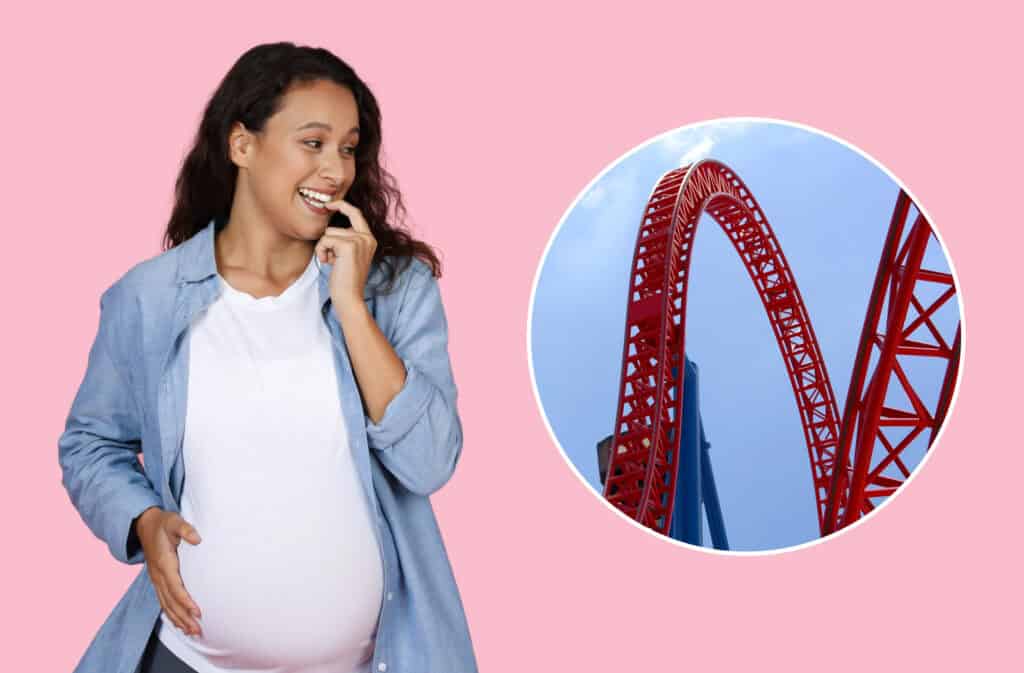
- Updated Feb 10, 2025
- Published
CRAFTED BY HUMAN
Crafted by human At Femia, we provide accurate and up-to-date information at every stage of your journey, from trying to conceive, pregnancy and postnatal support. All content is created by a real person based on in-depth research and own professional experience. Femia ensures that you will receive expert advice, strict accuracy and a personalized approach from our authors/medical experts. Learn more about our editorial policy.
FACT CHECKED
Fact checked At Femia Health, we maintain the highest standards of editorial excellence in delivering content focused on helping you conceive, guiding you through pregnancy, and supporting you postpartum. Explore our content review principles to learn how we ensure the accuracy and quality of our health and lifestyle tips for every stage of your journey.
Riding a roller coaster while pregnant isn’t recommended, even in the earliest stages. While your belly might not be visible yet, sudden drops, high speed, and sharp turns may cause pressure on the uterus, put the fetus under stress, and cause the early separation of the placenta from the uterus (placental abruption), where the baby stops getting oxygen and other nutrients from the placenta. Such activities may also cause early contractions, fetus injury, and pregnancy complications, including miscarriage.
As a newly pregnant woman, you’re likely discovering that many things you would previously do without a second thought now cause concern. Among these, you may be looking for an answer to a pretty common question: can pregnant women ride roller coasters?
The issue comes from the rapid starts and stops and the pressure against the body that may occur during such activities. Although everyone will make their own decision on how safe it is for them, it is a risk for all pregnant women and should be eliminated or avoided altogether. Let’s learn everything you need to know about riding roller coasters when pregnant.
Femia offers a personalized meal plan, symptom tracking
and more according to your pregnancy journey
Why pregnant women should be cautious with roller coasters
The good thing is that amusement parks usually make it easy to identify rides that may pose a certain risk to different types of people, including pregnant women.
Parks may recommend that pregnant women avoid rides that can create additional jarring forces within the uterus. Roller coasters, in this case, may lead to premature separation of the placenta from the uterus wall, which is medically known as placental abruption. If this happens, the fetus is deprived of oxygen and all the nourishing elements it normally receives through the placenta.
The same may happen even in slow automobile accidents because of the jarring force. This, in the worst cases, can cause pregnancy complications and miscarriage. Even though the jarring force is often less noticeable in the case of amusement parks, riding a roller coaster while pregnant still requires precaution.
👉Find out more: Which food can cause miscarriage: A comprehensive guide
Can you go on rides 3 months pregnant and earlier?
Although there is a belief that early pregnancy is still a time when there are little to no physical limitations, amusement park rides still pose certain risks. In fact, the first trimester is the most concerning time for a future mother, as the fetus is rapidly developing, causing your body to go through many internal changes to support pregnancy.
Even when minor, the forces and sudden jolts from amusement park rides—especially high-speed roller coasters, intense spinning rides, and rapid drops—can place undue strain on both mom and baby.
How rides can affect pregnancy and a fetus:
So, if you’ve wondered, “can you get on roller coasters while pregnant?” or thought about choosing other types of rides, here is how all of them can affect pregnancy and a fetus:
- High-speed rides and roller coasters: such rides usually involve rapid acceleration, deceleration, and abrupt changes in direction, jolting the body and putting stress on the uterus. This may significantly increase the risk of placental abruption.
- Spinning rides (e.g., Teacups, Tilt-a-Whirl): these rides often disrupt equilibrium and provoke nausea or dizziness, which is common in early pregnancy stages even without the rides. This may not affect the placenta, but it can cause balance problems, fainting, and increased abdominal discomfort.
- Free-fall and drop rides: intense and sudden g-forces in drop rides can momentarily compress the abdomen, causing significant pressure on the uterus and, therefore, the fetus. Riding such a ride or roller coaster while pregnant increases the risk of early pregnancy complications, including increasing the risk of placental abruption.
Prioritizing safety over the thrill
It’s always best to avoid riding a roller coaster while pregnant. Healthcare providers usually recommend that pregnant women avoid high-speed, high-impact rides, as they may cause unpredictable effects on the body.
Considering calmer rides, such as gentle carousels or slow-moving scenic attractions, is the safest option. If ever in doubt, seek medical advice based on your health, pregnancy stage, and how your pregnancy has been going so far.
👉Find out more: Orgasms during pregnancy: Your questions and concerns answered
Can you ride roller coasters while 3 weeks pregnant?
The general advice is to give roller coasters and other such rides a skip as soon as you know you’re pregnant. The pressure such rides can put on the abdomen can put your pregnancy and changing body at risk.
What happens if you accidentally ride a roller coaster while pregnant?
It’s natural to feel worried if you unknowingly went on an unsafe ride before wondering “can you ride roller coasters while pregnant?” If this happens, monitor your body for any unusual symptoms. It’s important to compare how you felt before to the first 24–48 hours after the ride. Here are some signs to watch for and when to consult a healthcare provider:
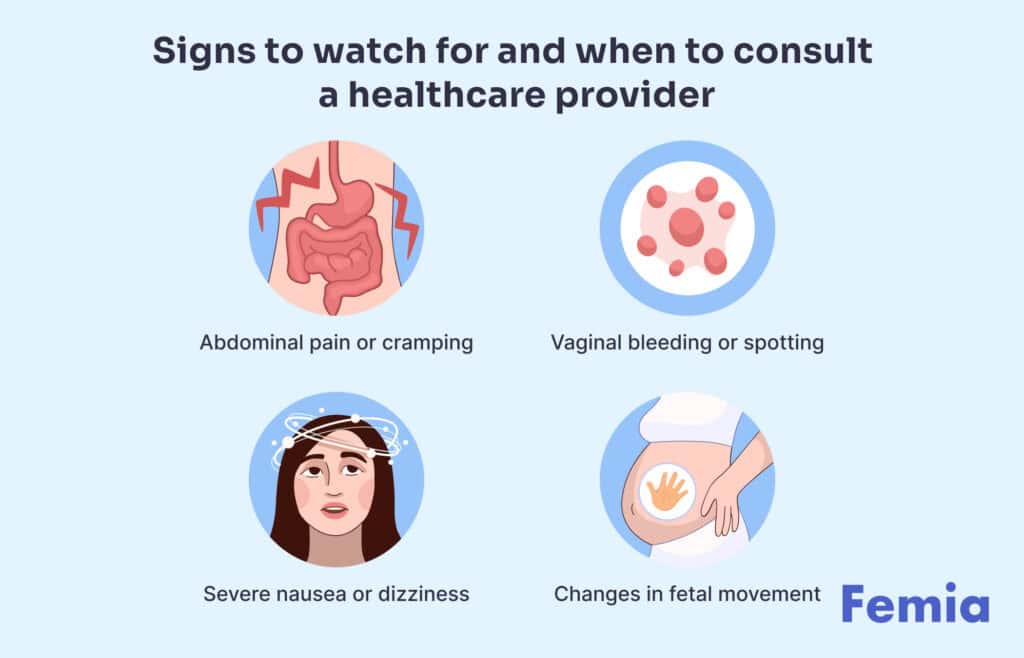
- Abdominal pain or cramping: mild discomfort may be normal, but any changes and intense cramping are a concerning sign.
- Vaginal bleeding or spotting: any bleeding or unusual spotting should be immediately discussed with a doctor.
- Severe nausea or dizziness: while it’s okay to feel unwell sometimes, extreme changes in your well-being are important to bring to a doctor.
- Changes in fetal movement (if you’re in a later stage of pregnancy): less or unusual movement requires a check-in.
👉Find out more: Difference between gas bubbles and baby moving: How to tell?
Are there any safe rides for pregnant women?
The good news is that being pregnant doesn’t mean you have to sit and watch while others have all the fun at an amusement park. There are some types of rides that get the all-clear from doctors.
Choose rides with no excessive spinning or drops. A slow-spinning carousel ride is considered safe, just like any other ride that doesn’t involve sudden drops in height.
It’s best to find rides that move at slow, consistent speeds and don’t generate any G force or send your body jerking back and forth. It’s always advisable to seek medical consultation if you have any doubts.
Roller coaster risks by trimester
Roller coaster while pregnant: first trimester
Roller coasters pose a significant pregnancy risk, even when the fetus is very small. Although the belly is not visibly growing yet, the embryo starts to develop vital organs and is attached to the uterine lining, making this stage especially sensitive.
That’s why all these sudden drops, high speeds, and sharp turns may disrupt early implantation, put stress on the uterus, and, rarely, even trigger contractions.
Second and third trimesters
As your pregnancy progresses into the second and third trimesters, the baby and uterus grow and make the physical impacts of a roller coaster while pregnant more dangerous. The restraint systems on such intensive rides are not designed for the pregnant body, so the growing belly experiences direct pressure on the abdomen, potentially harming the baby and causing placental abruption and contractions.
Additionally, the rapid motion can impact the amniotic fluid’s ability to cushion the baby from external forces, making injuries to both the mother and baby more likely. Therefore, during later pregnancy, it’s essential to avoid activities, like roller coasters, that could endanger maternal or fetal health.
Femia offers a personalized meal plan, symptom tracking
and more according to your pregnancy journey
Questions from the Femia community
Can I go to an amusement park if I'm pregnant but avoid the roller coasters?
Yes; you can enjoy the park and some slow rides that don't involve sudden drops from height, high speed, or sharp turns. In some parks, there might be a sign indicating which rides are not suitable for pregnant women, but make sure you double-check each ride for your personal safety.
Are water rides safe during pregnancy?
Water rides that involve sudden drops or forceful movement are not recommended during pregnancy.
Is there a specific trimester when it's safest to ride roller coasters?
The short answer is no, roller coasters have no "safe" trimester, so they should be avoided throughout the pregnancy. If you have any doubts, please consult a healthcare provider.
Can I go on rides in early pregnancy?
It's best to avoid roller coasters and similar rides during the entire pregnancy, but you can choose slower and safer rides if you want to.
The bottom line
Riding a roller coaster while pregnant poses significant safety risks across all stages of pregnancy—not just the later ones. The high speeds, sudden drops, and intense G-forces on these rides can create unexpected pressure on the uterus, risking placental abruption, early contractions, and even miscarriage.
This is particularly concerning in the first trimester—a critical time for fetal development, when even small stresses on the uterus can have lasting impacts. Instead of high-speed rides, opt for gentler, slow-moving attractions to enjoy amusement parks safely while pregnant. Always prioritize your health and, when in doubt, consult your healthcare provider for guidance on safe activities.
References
- Mayo Clinic. “Placental Abruption – Symptoms and Causes.” Mayo Clinic, 25 Feb. 2022, www.mayoclinic.org/diseases-conditions/placental-abruption/symptoms-causes/syc-20376458.
- “Miscarriage: Signs, Symptoms, Treatment and Prevention.” American Pregnancy Association, 27 Apr. 2020, americanpregnancy.org/healthy-pregnancy/pregnancy-complications/signs-of-miscarriage/.
- Cleveland Clinic. “Fetal Development.” Cleveland Clinic, 3 Mar. 2024, my.clevelandclinic.org/health/articles/7247-fetal-development-stages-of-growth.
- Cleveland Clinic. “Amniotic Fluid: Color, Smell, Function & Disorders.” Cleveland Clinic, 18 June 2022, my.clevelandclinic.org/health/body/23310-amniotic-fluid.
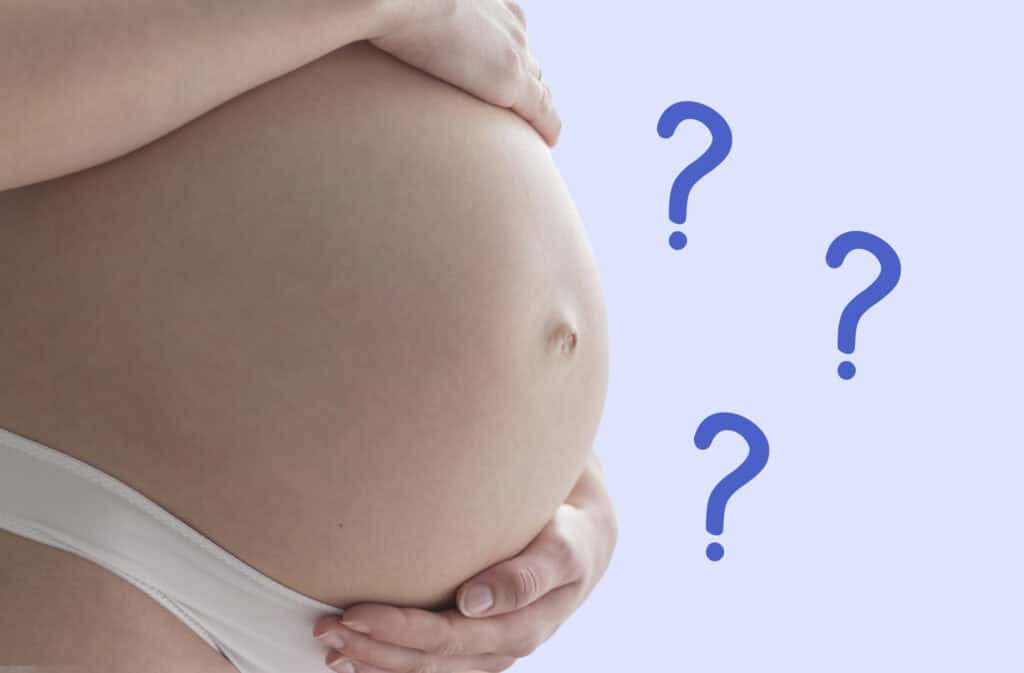
Learn about cryptic pregnancy, its causes, and how to detect it. Discover risk factors and common cryptic pregnancy symptoms. Expert insights from Femia.
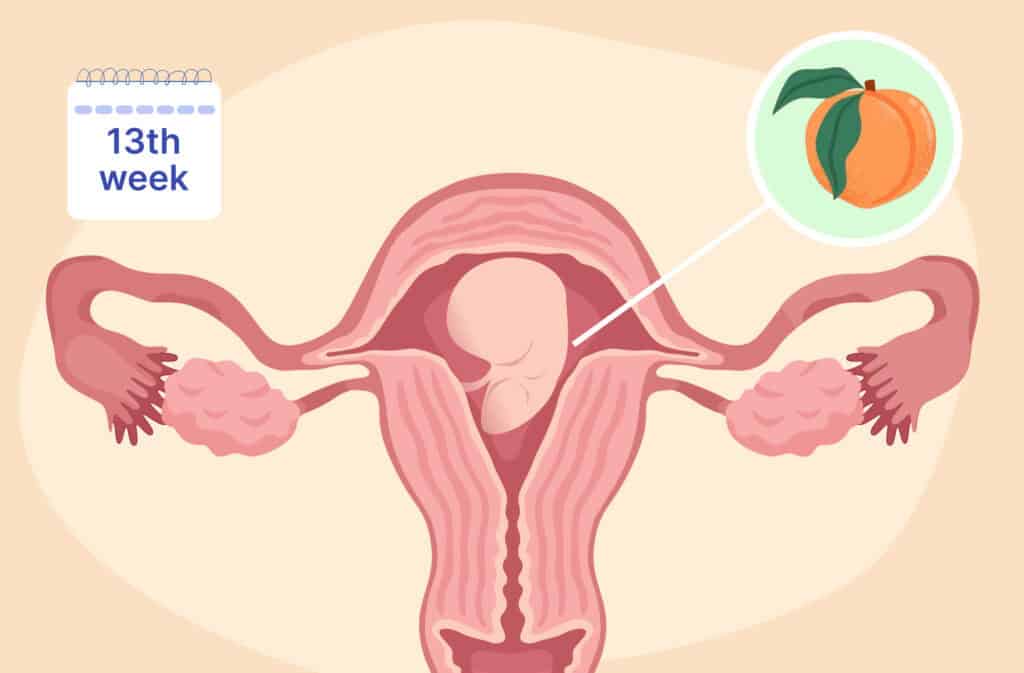
Discover what happens at 13 weeks pregnant, from baby’s development and bump changes to ultrasound insights and common symptoms.
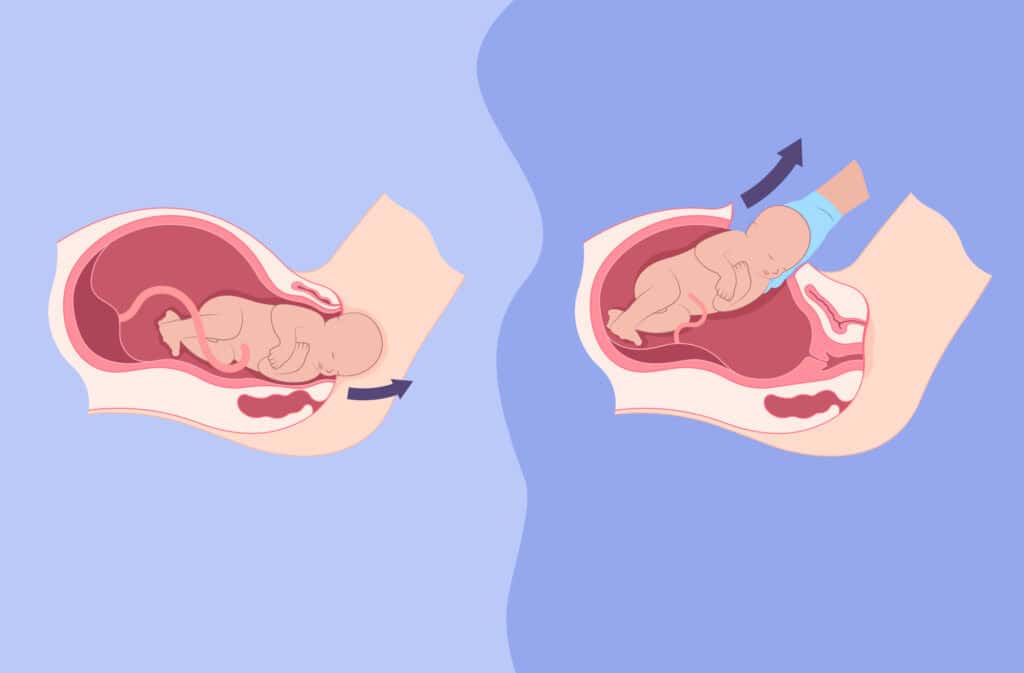
Explore the differences between C-sections and vaginal births including risks recovery time and what factors you should consider before making a choice.

